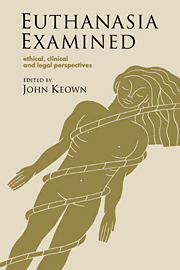Book contents
- Frontmatter
- Contents
- List of contributors
- Acknowledgements
- Foreword by Daniel Callahan
- Introduction
- 1 Euthanasia and the value of life
- 2 A philosophical case against euthanasia
- 3 The philosophical case against the philosophical case against euthanasia
- 4 The fragile case for euthanasia: a reply to John Harris
- 5 Final thoughts on final acts
- 6 Misunderstanding the case against euthanasia: response to Harris's first reply
- 7 Euthanasia: back to the future
- 8 The case for legalising voluntary euthanasia
- 9 Extracts from the Report of the House of Lords Select Committee on Medical Ethics
- 10 Walton, Davies, Boyd and the legalization of euthanasia
- 11 Where there is hope, there is life: a view from the hospice
- 12 Letting vegetative patients die
- 13 A case for sometimes tube-feeding patients in persistent vegetative state
- 14 Dilemmas at life's end: a comparative legal perspective
- 15 Physician-assisted suicide: the last bridge to active voluntary euthanasia
- 16 Euthanasia in the Netherlands: sliding down the slippery slope?
- 17 Advance directives: a legal and ethical analysis
- 18 Theological aspects of euthanasia
- Index
3 - The philosophical case against the philosophical case against euthanasia
Published online by Cambridge University Press: 03 May 2010
- Frontmatter
- Contents
- List of contributors
- Acknowledgements
- Foreword by Daniel Callahan
- Introduction
- 1 Euthanasia and the value of life
- 2 A philosophical case against euthanasia
- 3 The philosophical case against the philosophical case against euthanasia
- 4 The fragile case for euthanasia: a reply to John Harris
- 5 Final thoughts on final acts
- 6 Misunderstanding the case against euthanasia: response to Harris's first reply
- 7 Euthanasia: back to the future
- 8 The case for legalising voluntary euthanasia
- 9 Extracts from the Report of the House of Lords Select Committee on Medical Ethics
- 10 Walton, Davies, Boyd and the legalization of euthanasia
- 11 Where there is hope, there is life: a view from the hospice
- 12 Letting vegetative patients die
- 13 A case for sometimes tube-feeding patients in persistent vegetative state
- 14 Dilemmas at life's end: a comparative legal perspective
- 15 Physician-assisted suicide: the last bridge to active voluntary euthanasia
- 16 Euthanasia in the Netherlands: sliding down the slippery slope?
- 17 Advance directives: a legal and ethical analysis
- 18 Theological aspects of euthanasia
- Index
Summary
John finnis has produced an elegant and closely argued case against euthanasia. The argument is complex and I would like to take issue with almost all of it, although I think that very often the differences between us are not so great as may at first appear. Of necessity I will have to confine myself to one or two key points.
The case against euthanasia, as Finnis presents it, rests upon three foundations. They are his account of the moral importance of intention, his account of personhood and the distinction he makes between two types of killing. We will accordingly look at these in turn, taking note of some tangential issues along the way.
Before doing so, however, it is good to be able to start with a point of agreement. We both agree that ‘there is no morally relevant distinction between employing deliberate omissions … in order to terminate life (“passive euthanasia”) and employing “a deliberate intervention” for the same purpose (“active euthanasia”)’. We disagree, however, as will be obvious, as to what precisely counts as ‘employing’ either acts or omissions to a particular end.
THE MORAL IMPORTANCE OF INTENTION
Few would deny that we are morally responsible for the acts that we intend. The crucial issue is whether we are also and equally responsible for things we, voluntarily, bring about, for the things that are the consequences of our free choices.
- Type
- Chapter
- Information
- Euthanasia ExaminedEthical, Clinical and Legal Perspectives, pp. 36 - 45Publisher: Cambridge University PressPrint publication year: 1995
- 2
- Cited by



